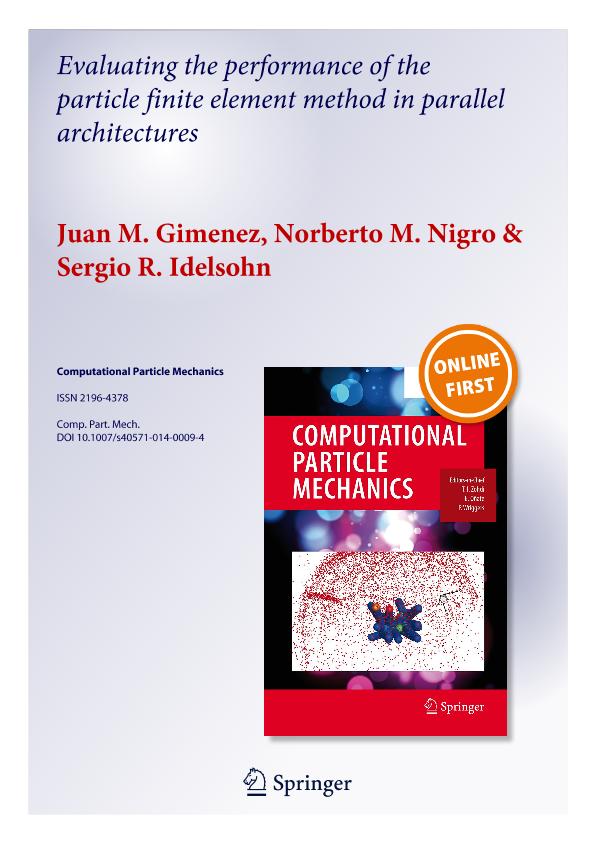Mostrar el registro sencillo del ítem
dc.contributor.author
Gimenez, Juan Marcelo

dc.contributor.author
Nigro, Norberto Marcelo

dc.contributor.author
Idelsohn, Sergio Rodolfo

dc.date.available
2017-07-04T21:28:59Z
dc.date.issued
2014-05
dc.identifier.citation
Gimenez, Juan Marcelo; Nigro, Norberto Marcelo; Idelsohn, Sergio Rodolfo; Evaluating the performance of the particle finite element method in parallel architectures; Springer; Computational Particle Mechanics; 1; 1; 5-2014; 103-116
dc.identifier.issn
2196-4378
dc.identifier.uri
http://hdl.handle.net/11336/19556
dc.description.abstract
This paper presents a high performance implementation for the particle-mesh based method called particle finite element method two (PFEM-2). It consists of a material derivative based formulation of the equations with a hybrid spatial discretization which uses an Eulerian mesh and Lagrangian particles. The main aim of PFEM-2 is to solve transport equations as fast as possible keeping some level of accuracy. The method was found to be competitive with classical Eulerian alternatives for these targets, even in their range of optimal application. To evaluate the goodness of the method with large simulations, it is imperative to use of parallel environments. Parallel strategies for Finite Element Method have been widely studied and many libraries can be used to solve Eulerian stages of PFEM-2. However, Lagrangian stages, such as streamline integration, must be developed considering the parallel strategy selected. The main drawback of PFEM-2 is the large amount of memory needed, which limits its application to large problems with only one computer. Therefore, a distributed-memory implementation is urgently needed. Unlike a shared-memory approach, using domain decomposition the memory is automatically isolated, thus avoiding race conditions; however new issues appear due to data distribution over the processes. Thus, a domain decomposition strategy for both particle and mesh is adopted, which minimizes the communication between processes. Finally, performance analysis running over multicore and multinode architectures are presented. The Courant–Friedrichs–Lewy number used influences the efficiency of the parallelization and, in some cases, a weighted partitioning can be used to improve the speed-up. However the total cputime for cases presented is lower than that obtained when using classical Eulerian strategies.
dc.format
application/pdf
dc.language.iso
eng
dc.publisher
Springer

dc.rights
info:eu-repo/semantics/openAccess
dc.rights.uri
https://creativecommons.org/licenses/by-nc-sa/2.5/ar/
dc.subject
Lagrange Formulations
dc.subject
High Performance Computing
dc.subject
Particle Methods
dc.subject
Distributed Memory
dc.subject
Pfem
dc.subject
Incompressible Navier-Stokes Equations
dc.subject.classification
Otras Ingeniería Mecánica

dc.subject.classification
Ingeniería Mecánica

dc.subject.classification
INGENIERÍAS Y TECNOLOGÍAS

dc.title
Evaluating the performance of the particle finite element method in parallel architectures
dc.type
info:eu-repo/semantics/article
dc.type
info:ar-repo/semantics/artículo
dc.type
info:eu-repo/semantics/publishedVersion
dc.date.updated
2017-07-03T19:52:02Z
dc.journal.volume
1
dc.journal.number
1
dc.journal.pagination
103-116
dc.journal.pais
Suiza

dc.description.fil
Fil: Gimenez, Juan Marcelo. Consejo Nacional de Investigaciones Científicas y Técnicas. Centro Científico Tecnológico Conicet - Santa Fe. Centro de Investigaciones En Metodos Computacionales. Universidad Nacional del Litoral. Centro de Investigaciones En Metodos Computacionales; Argentina
dc.description.fil
Fil: Nigro, Norberto Marcelo. Consejo Nacional de Investigaciones Científicas y Técnicas. Centro Científico Tecnológico Conicet - Santa Fe. Centro de Investigaciones En Metodos Computacionales. Universidad Nacional del Litoral. Centro de Investigaciones En Metodos Computacionales; Argentina
dc.description.fil
Fil: Idelsohn, Sergio Rodolfo. Institució Catalana de Recerca i Estudis Avancats; España. Consejo Nacional de Investigaciones Científicas y Técnicas; Argentina
dc.journal.title
Computational Particle Mechanics
dc.relation.alternativeid
info:eu-repo/semantics/altIdentifier/doi/http://dx.doi.org/10.1007/s40571-014-0009-4
dc.relation.alternativeid
info:eu-repo/semantics/altIdentifier/url/https://link.springer.com/article/10.1007%2Fs40571-014-0009-4
Archivos asociados
